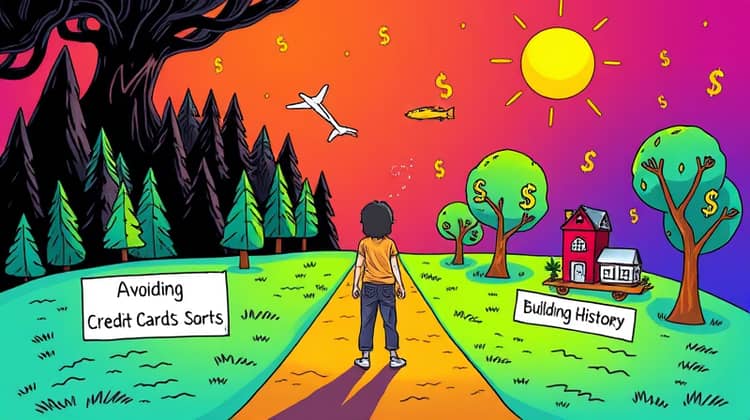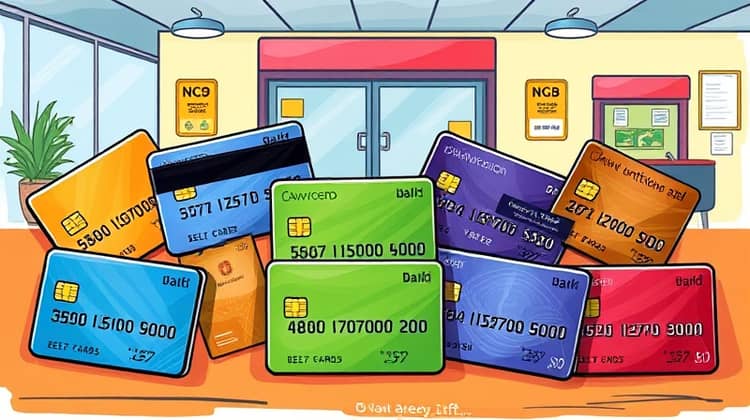Credit Card Myths: 5 Misconceptions You Need to Stop Believing

Navigating the world of credit can be daunting, especially with the sea of myths and misconceptions that surround credit cards. Many individuals believe certain stereotypes about credit cards which can lead to poor financial decisions. It’s critical to discern fact from fiction to make informed choices about our finances and to best utilize credit cards, if appropriate.
In this article, we will debunk five common myths about credit cards. Understanding the truth can help you manage your finances better and use credit cards to your advantage, rather than avoiding them out of fear or misinformation.
Let’s explore these misconceptions and set the record straight, starting with the idea that credit cards are inherently bad.
1. Credit Cards Are Always Bad

One of the most pervasive myths surrounding credit cards is the belief that they are always detrimental. This belief can stem from stories of people falling into debt due to poor management of their credit cards. However, it is essential to recognize that credit cards, like any financial tool, can be beneficial when used wisely.
Credit cards can help build your credit history, offer rewards such as cashback, and provide security for online purchases. When properly managed, credit cards are not inherently bad; rather, they can be a useful addition to your financial toolbox.
- Credit cards offer rewards programs and cashback options.
- They can help you build a credit history and improve your credit score.
- Credit cards often come with features that provide buyer protection.
While it's true that reckless use of credit cards can lead to debt, responsible management is key. Learning how to use credit cards wisely can bring financial benefits rather than pitfall. Overall, credit cards can be a valuable asset if used within a budget and paid off on time.
It's important to separate the tool from the behavior; credit cards themselves are not bad, but misuse can lead to negative outcomes.
2. Carrying a Balance Helps Your Credit Score

Many people mistakenly believe that carrying a balance on their credit card each month is necessary to maintain a good credit score. This misconception can encourage unnecessary debt and stress.
In reality, the credit scoring system rewards responsible credit management, which means paying off your balance in full each month. Maintaining a low credit utilization ratio is crucial, and carrying a balance does not contribute positively to this ratio.
- Your credit score is determined by factors such as payment history and credit utilization, not by carrying a balance.
- Paying your full balance on time reduces debt and improves financial health.
- Zero balances on credit cards can still contribute positively to your credit history.
To improve your credit score, focus on making timely payments and managing your credit utilization ratio effectively. Carrying a balance only serves to increase interest charges and could potentially hurt your long-term financial health.
Understanding how credit scores work can empower you to use credit more effectively. Stop believing the myth that you need to carry a balance to benefit your credit score.
3. You Should Avoid Credit Cards Altogether

Some individuals hold the belief that avoiding credit cards completely is the safest financial choice. This perspective can lead to missed opportunities to build a strong credit history, which is essential in today’s financial landscape.
While it’s true that credit cards require responsible management, opting out entirely can prevent you from establishing credit. Without a credit history, applying for loans or mortgages becomes challenging, often resulting in higher interest rates or outright denial.
- Utilizing credit cards responsibly can help you establish a good credit history.
- Having a credit card can provide financial flexibility and security.
- Credit cards can offer valuable perks, such as travel insurance and extended warranties.
Instead of avoiding credit cards, consider using them for manageable purchases and paying off the balance promptly. This practice will help you build credit without falling into debt.
In today’s economy, a solid credit score is invaluable; avoid the myth that eschewing credit cards is better for your financial health.
4. All Credit Cards Have High Interest Rates

A common belief is that all credit cards come with high interest rates, which can dissuade potential users. However, this is not entirely accurate. While some cards do carry hefty APRs, there are many options with low-interest rates available in the market.
It's crucial to shop around and compare different credit cards to find the one that best suits your financial situation. Credit unions and banks often offer competitive rates on their credit products, making it possible to secure a card without exorbitant interest rates.
- Many credit cards offer promotional low-interest rates for a limited time.
- Some cards specifically cater to customers looking for low-interest options.
- Credit cards with lower rates may come with fewer perks but can be more beneficial for long-term use.
Be informed about the variety of options available and choose a card that meets your needs without excessive rates. Understanding your options can lead to better financial decisions and help avoid unnecessary costs.
So, don’t simply assume that all credit cards will be financially burdensome regarding interest; take the time to explore your options.
5. Credit Cards Are Only for Emergencies

The idea that credit cards should only be used in emergencies can limit their potential benefits. This belief often causes individuals to shy away from using their cards altogether, even for everyday expenses that can be managed easily.
In reality, utilizing credit cards for regular expenses and paying them off each month can help in earning rewards and maintaining a positive credit score. This habit can also protect against unforeseen emergencies without requiring a full financial burden down the road.
- Use your credit card for known expenses like groceries or gas to build credit history.
- Pay off the balance every month to avoid interest and maximize benefits.
- Keep track of your spending to remain within your budget and maintain financial health.
Responsibly using credit cards not only allows you to build a solid financial foundation but also helps you gain rewards and manage emergencies better. So, breaking the myth that credit cards are only for emergencies can open up new opportunities for financial growth.
Using a credit card wisely can actually prevent financial stress during emergencies, allowing you to handle unexpected bills with greater ease.
Breaking the Myths

By understanding the truth behind these common credit card myths, you can navigate the landscape of credit more confidently. It's essential to debunk these misconceptions to take full advantage of the benefits credit cards can offer.
Take the time to research and weigh your options before making decisions about credit. Building a positive credit history is crucial and can be achieved through responsible credit card use.






